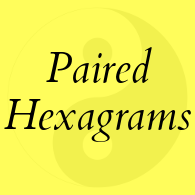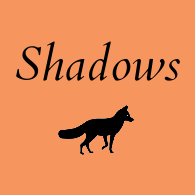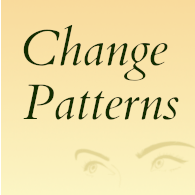The second line of Hexagram 11 generates some of the most strangely varied translations. Here are two from the same book – John Minford’s I Ching, which contains two incarnations of the Yi, as ‘Book of Wisdom’ and ‘Bronze Age Oracle’:
‘Embrace the wilderness, ford the river. Do not forsake those far away. Friends depart. The course is held at the centre.’
and
‘Float across the river with a big gourd. No drowning, cowries lost. Reward in mid journey.’
How can these possibly be two translations of the same Chinese text?
The gourd
The first word in the Chinese is 包 bao, which has a general meaning of containing, wrapping, embracing or bearing with – as in the Wilhelm/Baynes version of 11.2, ‘Bearing with the uncultured’. The second word, 荒 huang, means wasteland, something barren or just empty – ‘uncultured’ for Wilhelm, ‘wilderness’ for Minford.
However… some scholars think bao was meant as pao, 匏 (you can see it includes the ‘bao‘ component), meaning a gourd. Then huang can emphasise the gourd is hollow, or apparently can just mean ‘big’.
This at once makes the line more coherent, because hollow gourds are useful as floats when fording a river – and the verb used here for river-crossing means specifically fording, without a boat.
Also, when this line changes, the trigram qian, heaven, is hollowed out to become li, fire, which according to the Shuogua is associated with ‘coat of armour and helmet, … turtles, crabs, snails, mussels, tortoises, trees that are hollow and dead at the top’ (Rutt’s translation) – in other words, with things that are shaped like the trigram itself, hollow with a hard surface.
(There’s one other gourd in the Yi, the melon at 44.5 – which is also qian changing to li.)
Adding all this up, I’m persuaded that this gourd is part of the line, not just a scholar’s fever-dream. It’s an exquisite image of emptiness that becomes lightness, of disappointment and moving on – and also, maybe, of free thinking.
Along with the gourd, Minford mentions a story of Zhuangzi. It’s worth reading the whole of the first chapter, which describes ‘the difference between small and great’ – for instance, when a little fluttering quail laughs at the great Peng bird that soars above the clouds, unable to grasp its reality at all. Since Hexagram 11 is a time when ‘small goes, great comes’, this should spark our interest.
In this chapter’s final story, a logician complains to Zhuangzi that the giant gourds he grew were too big to be of any use: filled with water, too heavy to lift; cut up to make drinking vessels, too shallow to hold liquid. He smashed the useless things to bits. Zhuangzi calls him stupid, and says he could have used the gourds to float over rivers and lakes. ‘The gourd is hollow,’ says Yi; ‘use it to ford the river.’
Actually, I think this has things in common with the traditional interpretation: that this line is about someone who ‘does not leave out those who are far away, thus cliques disappear’ (Lynn). Wang Bi says ‘the way he uses his heart and mind is so very broad, there are none he abandons at a distance.’ Zhuangzi would also like his interlocutor to use his heart-mind less narrowly.
Abandoning and leaving behind
The next five words give rise to even more different translations:
不遐遺朋亡
Not distant/abandoning leaving-behind/abandoning friends vanished.
In itself, that suggests a paradox: if there is no distancing or abandoning, how come friends are lost?
The traditional view is that this means ‘not distancing from those left behind’ (or ‘not neglecting what is distant – Wilhelm) and the ‘friends’ that vanish are a clique or faction; the logic of the whole is that this is about being more broad-minded, less parochial.
Minford makes the problem disappear altogether by translating 朋 peng as ‘cowries’. Schilling does the same, and says this loss is contrasted with the reward gained mid-journey.
Geoffrey Redmond makes sense of it by repunctuating: ‘Wrap in gourds to cross the He River, not far off. Leaving behind friends, who will be lost.’ The river in this line is the He – at least, ‘He’ may well refer to a specific river. And the He does flow ‘not far off’ from Mt Tai – which shares its name with this hexagram.
In 2010 I was happy to follow Bradford Hatcher’s example and think of ‘distant/abandoning’ and ‘leaving behind/abandoning’ as a single unit of meaning. Now I wonder whether they might be meant as a contrast: ‘Not abandoned, (just) left behind, friends vanish.’ But since no-one else has come up with that idea that I know of, it’s probably wrong.
This may be sacrilegious, but I actually don’t think it matters all that much exactly how we parse this part of the line – whether it’s ‘Not distancing or leaving behind’ or ‘Not left far behind’ or ‘Not abandoning those left behind’ or even ‘Not abandoned, only left behind’. The bigger point is the contrast between all this abandoning, distancing and losing, and moving towards the centre – deliberately setting out to cross to the opposite bank – where, after all the loss, you gain honour.
Friends, or cowries, vanish
Swimming across, up to your eyes in river water, you can’t keep everything in view; you need to sight on something tall on the opposite bank, so as not to get disoriented. Or as the paired line, 12.5 puts it,
‘It is lost, it is lost! (其亡其亡)
Tie it to the bushy mulberry tree.’
As you swim across, friends vanish – 亡 wang, the same word as in 12.5 – simply because your perspective has shifted, not because you intended to leave them. ‘Friends vanishing’ could be just another instance of ‘small going’ – certainly the tradition that sees these friends as a clique would agree.
Friends, or cowries? The character, 朋 peng, is originally a picture of paired strings of cowries. (Perhaps the idea-evolution is from matched strings to matched people, friends?) So a translation of ‘cowries lost’ makes sense in theory – but in practice, 11.2 for me has always been about friends and partners lost.
I once received this line when I asked what to learn from a friend who had recently died, who was exceptionally powerfully present to many people after her death. Our friend was gone from our sight – or we had disappeared from hers – but she forded the river without abandoning those she left behind.
Brightness Hiding
Changing this line connects Flow to Hexagram 36, Brightness Hiding, and the line pinpoints where these two hexagram pictures meet. Friends vanish from sight; the light is hidden away. 11.2’s swimmer is loyal to something distant and invisible to other people, like Prince Ji. Here’s how Flow can hide and wound the light, when its current sweeps your friends out of sight, and you’re left alone.














It’s amazing how, when reading this in the context of a question, the meaning just comes right out. Thank you for this enlightening article, Hilary!